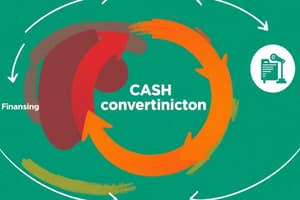Podcast
Questions and Answers
What does having plenty of Retained Earnings indicate about a business?
What does having plenty of Retained Earnings indicate about a business?
- It is generating income consistently (correct)
- It has sufficient cash flow
- It has high liability levels
- It can cover all debts easily
What type of asset is the wagon categorized as?
What type of asset is the wagon categorized as?
- Current Asset
- Operating Expense
- Intangible Asset
- Fixed Asset (correct)
What feature of the wagon makes it classified differently from a building?
What feature of the wagon makes it classified differently from a building?
- It has a higher cost
- It is smaller in size
- It can be moved (correct)
- It requires maintenance
What term describes fixed assets that are movable, like the wagon?
What term describes fixed assets that are movable, like the wagon?
What does the left side of the Balance Sheet primarily reflect?
What does the left side of the Balance Sheet primarily reflect?
What is the primary factor that runs a business on a daily basis?
What is the primary factor that runs a business on a daily basis?
What could lead to misinterpretation when looking at retained earnings on a financial statement?
What could lead to misinterpretation when looking at retained earnings on a financial statement?
Which statement reflects a common misconception about retained earnings?
Which statement reflects a common misconception about retained earnings?
What impact does depreciation have on earnings?
What impact does depreciation have on earnings?
What is the nature of depreciation in relation to cash flow?
What is the nature of depreciation in relation to cash flow?
Flashcards are hidden until you start studying
Study Notes
Week Five Recap
- The lemonade stand is experiencing slow business due to a softball tournament happening at the park.
- To address this, the owner decides to get a mobile lemonade stand.
- The owner purchases a wagon for $20, which is classified as a Fixed Asset known as Equipment.
- This new equipment is recorded separately on the Balance Sheet.
- The owner is short on cash and purchases $30 worth of lemonade on credit.
- The purchase is recorded on the Balance Sheet as a $9 increase to Accounts Payable.
- Despite being profitable, the stand has a zero cash balance and is reliant on assets.
- This highlights a crucial distinction: Earnings are not Cash.
- Cash is the driving force behind day-to-day operations, not Profits.
- Profits indicate earnings but do not guarantee available Cash on hand.
- The wagon is depreciated using a 2x straight-line method, resulting in a depreciation expense of $4 in the first year.
- Depreciation is a non-cash expense, reducing earnings but not appearing on the Cash Statement.
- Accelerated depreciation, like the 2x straight-line method, benefits businesses by allowing for tax savings in earlier years versus later years.
- Taxes must be paid on profits, and this week's 12profitissubjecttoa2512 profit is subject to a 25% tax rate, resulting in 12profitissubjecttoa253 in taxes.
- The final earnings for the week are $9 after taxes.
Important Takeaways
- Cash is crucial for day-to-day business operations.
- Earnings are not the same as Cash.
- Profits can be used to purchase assets, but having assets does not equate to having Cash.
- Depreciation is a non-cash expense that impacts earnings but does not affect the Cash Statement.
- Accelerated depreciation methods can save businesses tax dollars.
- Businesses need to pay taxes on their profits.
Studying That Suits You
Use AI to generate personalized quizzes and flashcards to suit your learning preferences.




